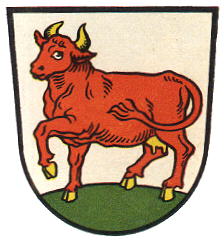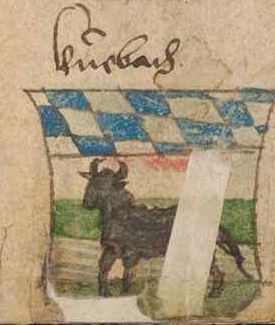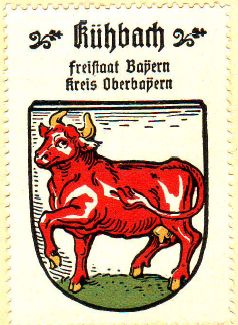Kühbach: Difference between revisions
Knorrepoes (talk | contribs) m (Text replacement - "manuscript from 1599]]" to "manuscript from 1599]") |
Knorrepoes (talk | contribs) m (Text replacement - ". ===Origin/meaning===" to ". |- |'''English''' | {{blazon wanted}} |} ===Origin/meaning=== ") |
||
| Line 11: | Line 11: | ||
===Official blazon=== | ===Official blazon=== | ||
*(de) In Silber auf grünem Boden eine schreitende rote Kuh. | *(de) In Silber auf grünem Boden eine schreitende rote Kuh. | ||
|- | |||
|'''English''' | |||
| {{blazon wanted}} | |||
|} | |||
===Origin/meaning=== | ===Origin/meaning=== | ||
Kühbach received town rights in 1481 from George the Rich, Duke of Niederbayern-Landshut. At the same time the first seal was made, which already showed the canting composition of a cow (Kuh) and a stream (Bach). All later seals and images have shown the same composition, although the size and shape of the cow, and sometimes the colours, differed widely during the centuries. | Kühbach received town rights in 1481 from George the Rich, Duke of Niederbayern-Landshut. At the same time the first seal was made, which already showed the canting composition of a cow (Kuh) and a stream (Bach). All later seals and images have shown the same composition, although the size and shape of the cow, and sometimes the colours, differed widely during the centuries. | ||
Revision as of 06:55, 5 July 2022
This page is part of the German heraldry portal Deutsche Wappensammlung |
Heraldry of the World |
|
German heraldry:
|
Selected collector's items from Germany:
|
KÜHBACH
State : Bayern
District (Kreis) : Aichach-Friedberg (until 1972 Aichach)
Additions : 1972 Oberschönbach, Stockensau; 1978 Haslangkreit (partly), Unterbernbach (partly)
Official blazon
- (de) In Silber auf grünem Boden eine schreitende rote Kuh.
|- |English | No blazon/translation known. Please click here to send your (heraldic !) blazon or translation |}
Origin/meaning
Kühbach received town rights in 1481 from George the Rich, Duke of Niederbayern-Landshut. At the same time the first seal was made, which already showed the canting composition of a cow (Kuh) and a stream (Bach). All later seals and images have shown the same composition, although the size and shape of the cow, and sometimes the colours, differed widely during the centuries.
| The arms in a manuscript from 1599 |
The municipal stamp shown in 1892 |
| The arms by Hupp in the Kaffee Hag albums +/- 1925 |
Contact and Support
Partners:
Your logo here ?
Contact us
© since 1995, Heraldry of the World, Ralf Hartemink 
Index of the site
Literature : Stadler, 1964-1971, 8 volumes.















